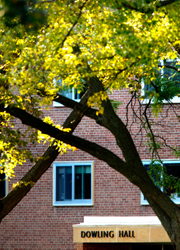A grant from Counseling and Psychological Service made a training program on suicide prevention possible for the Residence Life staff Oct. 9-10.
Associate Director of Residence Life Cari Fealy said Counseling and Psychological Services trained the staff on ways to approach these “tough conversations” with any of the 1,500 students living in residence halls.
“They thought it would be a great idea to have all of our staff trained because we have enough people living in the halls that could potentially have suicidal ideations,” Fealy said.
The program walked the residence life staff through a three-step process on how to effectively talk about suicide. Fealy said the staff only recently received the training because of the grant money’s timing, but in the future,she said Residence Life will incorporate this into its annual August training.
Senior Unis Doeway said resident advisers go through extensive training throughout the year to provide for their residents. In one of the sessions, “Behind Closed Doors,” former RAs act out skits about substance abuse, domestic abuse and other difficult subjects in an effort to teach incoming RAs.
“In my opinion, this is one of the most effective tools we use during RA training because you have the chance to actually practice how to handle the situations that happen within the residence halls,” Doeway said.
Director of Residence Life Aaron Macke said residents go through a variety of challenges on a daily and yearly basis. Emotional or psychological challenges can be carried to college from high school, but some challenges can also develop at a university due to other factors, such as being away from home, unfamiliarity and new academic challenges.
“Our RAs, (apartment coordinators) and (operational managers) are living within the halls and working with our residents very closely … and are often the first people at the university in terms of staff that residents will go to when faced with a challenge or dealing with trauma or anxiety,” Macke said. “They need to be trained and prepared for how to respond to that.”
Doeway said the “Tough Conversations” session was a powerful learning tool.
“The training gave us tools on how to appropriately help these students so that we don’t overlook certain actions that may be a red flag for suicide,” Doeway said.
Macke emphasized that the Residence Life staff do not present themselves as professional counselors, but that they have adequate training to provide insight for difficult conversations.
“When it comes to high level, we do not have the expertise to help any of that go away, but we do have the ability to listen and to be present and to provide services here at the university or outside the university,” Macke said.
Doeway said RAs are prepared to handle serious problems and are comfortable addressing issues as they arise.
“With the various trainings we attended during RA training, being able to learn from each other and having our hall directors and grad students to guide us through, we are more than able to handle serious problems that occur within the halls,” Doeway said.
If students are experiencing extreme anxiety or suicidal thoughts, Fealy and Macke said they want students to know that “they are not alone.”
“I think it’s important that students understand that they have colleagues that are here who are going through some very difficult times and that we, as staff, have a very important role at times listening to those students and getting them the help that they need,” Macke said.
St. Thomas has two specific departments that can offer professional help to students who find themselves facing tough challenges or are thinking about suicide. Counseling and Psychological Services located on third floor of Murray Herrick Campus Center has professionally trained and educated counselors with confidentiality. Student Health Services in the basement of Koch Commons has a psychiatrist on staff.
Zach Zumbusch can be reached at zumb8499@stthomas.edu.



